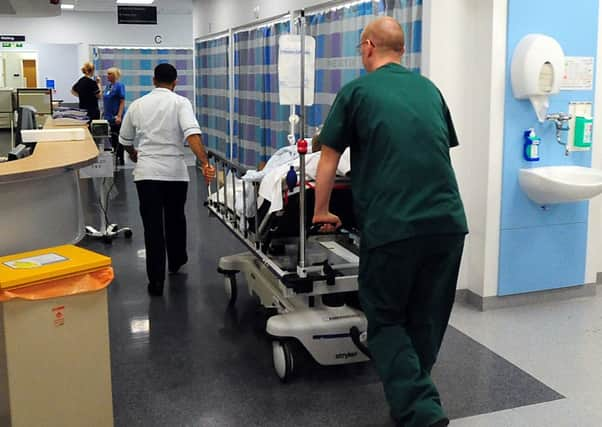Paul Flynn: Realities of providing 24/7 emergency care


While people will be familiar with the idea of a “postcode lottery” when it comes to healthcare, there is increasing evidence of what you could call a “calendar lottery”, or a variation in the quality of care received depending on what day, or time of day, a patient is admitted to hospital.
Mounting evidence shows some hospitals are not delivering the same high standard of care at weekends and nights as they are during normal working hours.
Advertisement
Hide AdAdvertisement
Hide AdThis means that patient outcomes can be worse on a Saturday, for example, than they are midweek. This is in large part because of lack of access to specialist and diagnostic care out of hours. At best it means a patient must wait until the next “working day” for their care to progress and at worst it can be the difference between life and death.
As doctors, we don’t believe it’s acceptable for a patient’s care to be determined by what day of the week it is.
That’s why the British Medical Association has published a paper calling for more seven-day services to be available to seriously-ill patients, improving outcomes for those who fall ill at evenings and weekends.
This won’t be easy, and will require system-wide change. Some hospitals are already working with staff to find ways of providing improved access to services across the week, but there is currently no agreed model for delivering this, something the BMA wants to change.
Advertisement
Hide AdAdvertisement
Hide AdMany doctors already work out of hours but providing greater access to emergency care will inevitably require more staff being in hospital during weekends and evenings.
Doctors recognise this and that’s why the BMA is currently in discussions with the government on how to develop work patterns which deliver emergency, urgent and acute services seven days a week while safeguarding the need for a healthy work-life balance for doctors.
But more doctors alone will not be enough. These changes will also require other services and NHS staff to be available at evenings and weekends.
Doctors need to be able to order scans and blood tests for example, and, where appropriate, discharge patients. This will require support, diagnostic and administrative staff as well as social and community care being available throughout the week.
Advertisement
Hide AdAdvertisement
Hide AdSo there is much work to be done on determining a workable and affordable model for improved seven-day services.
But the bottom line is that patients who fall seriously ill should have access to the same high quality care, whatever time of the day or night they need it, and doctors are committed to working with hospital managers, the Government and patients to ensure we come up with a solution.
Those reading this will understandably ask why should only emergency care be rolled out? Why shouldn’t what are called “routine” services such as knee or hip operations be available 24/7?
The answer is a simple one; resources. The NHS has to operate within a finite budget and workforce. The reality is the current system is already buckling under enormous pressure.
Stretching it further would lead it to breaking point.
Advertisement
Hide AdAdvertisement
Hide AdGiven the economic climate, the NHS simply doesn’t have the funding, resources and workforce to provide a full service 24 hours a day.
As such, we have to prioritise what services we can afford to deliver seven days a week. And we believe ensuring seriously ill patients have access to high quality, round the clock emergency care must be the priority. Only once this has been achieved can the debate start as to what other services can be provided seven days week.
While much of the focus on seven-day services has been on hospital care, there have been some recent announcements about access to GPs, such as a pilot scheme to extend GPs opening hours across seven days.
We will be supporting GPs taking part and looking closely at the results of this pilot to see how it works in practice.
Advertisement
Hide AdAdvertisement
Hide AdThere is concern over whether stretching the current workforce across seven days could have an impact on the quality of weekday services so we will need to access whether and how this could apply at a national level.
Doctors play a leading role in driving change in the NHS and we are determined to be part of the solution when it comes to delivering more seven-day services.
The public rightly expects, and doctors want to deliver, high quality care when patients need it most. That’s the principle behind our proposals and we’re committed to working with stakeholders across the NHS to make it a reality.
*Dr Paul Flynn is chairman of the British Medical Association’s Consultant Committee.